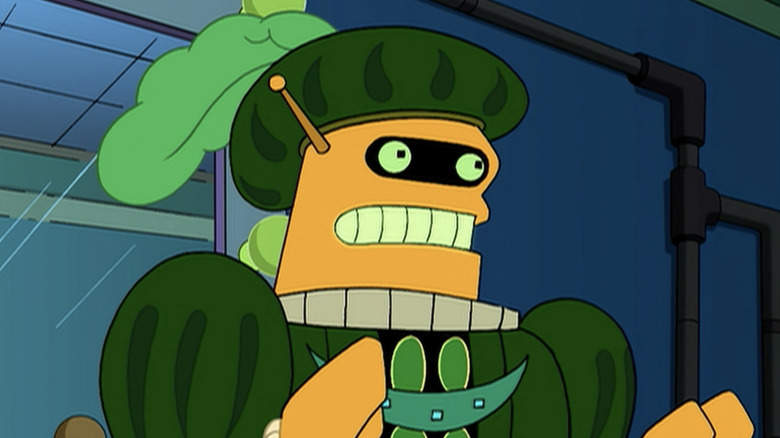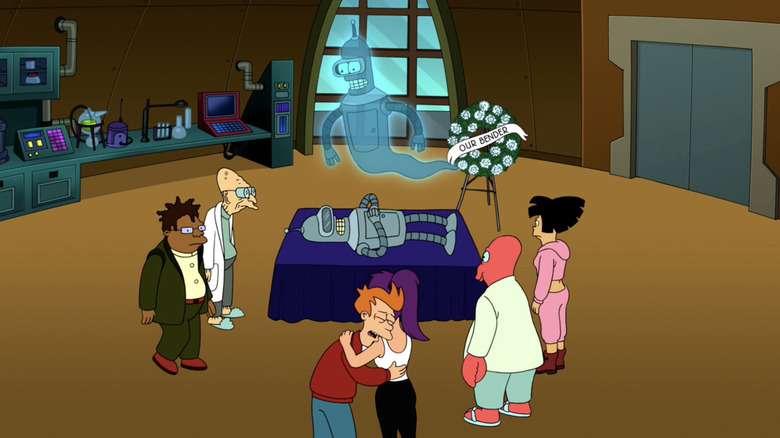Futurama: Who Is The Show's Oldest Robot & Why Does It Matter?
Because the science-fiction sitcom' "Futurama" is set during the early 3000s, it should come as no surprise that the series features a vast assortment of comical robots. A few fan favorites include "Hedonismbot" (Maurice LaMarche), whose body is modeled to look like an overweight Roman hedonist gorging himself on grapes, the excitable robot mafioso "Clamps" (LaMarche), and series lead Bender Rodriguez (John DiMaggio).
These robots are often shown to have incredibly long lifespans and remarkable durability, something Bender showcased in the Season 6 premiere "Rebirth" when he survived a doomsday device from Professor Farnsworth (Billy West). As such, some "Futurama" fans have probably wondered which of the show's robots have been around the longest, which is sort of a tricky question all things considered. Excluding timeline alterations made via time-travel, the acclaimed acting robot Calculon (LaMarche) is the oldest robot character we've met in "Futurama" — being over 1,000 years old at the time of his death in Season 7's "The Thief of Baghead."
In the Season 2 episode "The Honking," Calculon reveals that he was actually alive in the year 2019, being at that time nothing more than a robotic arm used to build an evil robotic car called "Project Satan." Over the centuries, he changed identities countless times, and nearly all of the great acting robots from the past are revealed to have actually been Calculon in disguise. As such, it can be said that Calculon is chronologically the oldest robot we meet in "Futurama," though technically, Bender has him beaten by a few thousand years.
Bender is technically older than the universe itself
During the course of his employment with Planet Express, Bender Rodriguez has gone on several time-focused adventures that have transformed him into one of the oldest characters in fiction, and by far the oldest robot in Futurama.
Although we know that Bender was created around the year 2996, his head is actually 1,049 years older than the rest of his body, since it was left behind in the year 1947 during the time-traveling shenanigans of "Roswell that Ends Well." On top of this, Bender likely added hundreds of thousands of extra years to his life during the events of "Bender's Big Score." Within this direct-to-video movie, Bender utilizes a one-way time machine to repeatedly steal treasure from across history, simply waiting until the present day in order to bring those items home.
As if Bender's paradoxical age wasn't already convoluted enough, one can argue that the episode "The Late Philip J. Fry" actually adds several billion years more to his already immense life. Within the episode, Bender, Fry, and Professor Farnsworth use a "Forwards Time Machine" to travel to the end of the known universe, twice. Although Farnsworth clarifies that the machine keeps them at the same age as they travel through time, by the time they reach their original point in the cycle they've passed witnessed the death of two separate universes, potentially making Bender several billion years older than any other robot in the series.
Bender's advanced age could have dire consequences down the line
While it's certainly very interesting to explore the reason why Bender Rodriguez holds a claim as one of the oldest characters in all of television, some viewers might still be wondering why his advanced age actually matters to the show.
Though we've seen Bender withstand nuclear bombs and survive countless centuries against the Earth's elements, there's no way of knowing how or when age will finally catch up to the lovably foul-mouthed robot. In fact, despite being practically "immortal," we've already seen Bender die on a fewl occasions; being murdered and transformed into a "robot ghost" in "Ghost in the Machine," and being crushed to death in the aforementioned "The Late Philip J. Fry." The series has even gone out of its way to emphasize the fact that Bender's death (when it finally comes) is completely final since he was mistakenly built without a backup copy.
As such, it's probably not crazy to suggest that one day old age might finally break down Bender's circuits and snuff him out, particularly now that his story is set to continue in Hulu's revival of "Futurama." Although Bender has managed to outlast two separate universes and countless years beneath the ruins of old New York City, it's not out of the question that we'll see him die of old age at some point in the future, something that could add a heartbreaking twist to the series finale of "Futurama."


